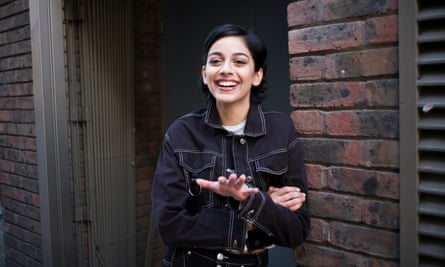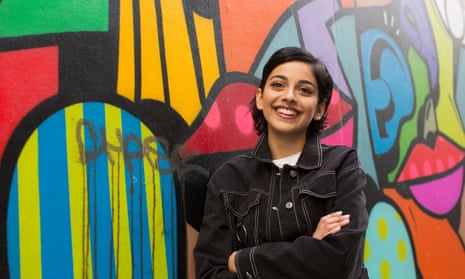While many drama students will be supplementing their income by stacking shelves in a supermarket, and perhaps treading the boards in their local faculty production, one student from a small town in Wales will be swapping Shakespearean plays for the glitz and glamour of the world’s biggest film industry when she makes her debut in a high-profile Bollywood release.
Banita Sandhu, who is studying English literature at Kings College London, is in the unique position of balancing coursework deadlines with hitting the headlines after being plucked from obscurity to star in the film October opposite Bollywood heartthrob Varun Dhawan, the Indian equivalent of Liam Hemsworth.
Sandhu’s journey from student to potential star could have been taken from the plot of a Bollywood film itself. She was brought up by her second-generation, British Indian parents in Caerleon, on the outskirts of Newport in south Wales, before moving to London at 18 to start her degree. Her big break came during her first year, when she was offered a high-profile ad campaign for Vodafone India, which was broadcast during the Indian Premier League cricket season.

“My parents were 100% supportive of my acting on the condition that I got an education,” says Sandhu. “I figured if I study in London, I can also go to castings. At first I was reluctant to do the advert because I wanted to be a serious actor, but when you’re a student and you see the pay and travel, I couldn’t say no.”
Her acting potential was spotted by the acclaimed director Shoojit Sircar, known for female-centric films such as the courtroom drama Pink, which he wrote and produced. It won rave reviews for its exploration of Indian rape culture. After working with Sircar on a chewing-gum advert, Sandhu was offered the lead role in October, an unconventional love story about a group of carefree students on a hotel-management placement, where a series of events forces them to reevaluate their lives.
“Bollywood is a massively patriarchal industry and I did have a few offers, but they either wanted me in a bikini or to play the love interest,” she says. “In this role, my character has her own dilemmas and issues separate from the hero.”
While Bollywood is traditionally perceived as less progressive than western cinema, Sandhu expresses frustration with the lack of three-dimensional roles for Asian women in the UK. “I struggled to fit into their version of what a British Asian girl is,” she says. “As a third-generation British Indian, I’m not affected by problems like arranged marriages. That stereotype is from 30 years ago and that’s not where we are at now as a society. I went to India because, despite the challenges of moving to a new country and the language barrier, I was being offered the kind of roles that I wasn’t getting here.”
The lack of representation on screen not only had a profound effect on her acting ambitions, but also in coming to terms with her cultural identity, as one of only a handful of Asian girls in her small, predominantly white town. “I really struggled with my identity as a kid. I used to hate my skin colour and wished I was the blond girl who all the boys liked. If I had people who looked like me on TV, I wouldn’t have felt like that. There was Bend It Like Beckham and East is East, but that was it.”
In preparation for her Bollywood debut, Sandhu, who only spoke rudimentary Punjabi, faced the additional challenge of learning a new language. She took lessons in Hindi for a year before filming. “I’m still not fluent and I get pretty nervous speaking. Luckily most of my lines were a hybrid of English and Hindi. That wasn’t just to accommodate me; it is the way most young people speak in India, so it was an accurate representation.”

Balancing her Bollywood career with her studies has become increasingly fraught. “There is a lot of time management involved,” she laughs. “If I am on a 10-hour flight, I will study, then get off the plane and go straight to an interview, or come back from a day’s filming and hit the books. In one way, it works out well because I have my life in India which is crazy, but here, nobody knows who I am, so I can just be normal and that keeps me grounded. On my English literature course, I am one of only three Asian girls and a few Middle Eastern girls and they are all super excited, but all my white friends were all: ‘Whatever.’ They didn’t get it until the trailer hit and when it got the response it did … then they realised.”
October is in cinemas from 13 April
